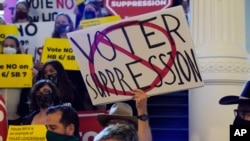Texas Republican Governor Greg Abbott is vowing to force state lawmakers to vote later this year on a measure that would impose new ballot restrictions, after Democrats walked out of a legislative session late Sunday to prevent its immediate passage.
Abbott said he would add the bill to a special state legislative session he plans to call to change geographic boundaries for legislative districts.
“Legislators will be expected to have worked out the details (of the voting rights measure) when they arrive at the Capitol for the special session,” he said on Twitter.
But Democrats, with their dramatic walkout shortly before the end of the legislative session, unexpectedly left Republicans in the state House without a legislative quorum to immediately pass the new voting restrictions.
Democrats have contended the measure would limit voting by Blacks and Hispanics, effectively shrinking the size of the electorate to curb their influence in future elections and help Republicans.
U.S. President Joe Biden over the weekend called the Texas legislation “wrong and un-American,” and Democrats vowed if the bill passed to immediately challenge it in court.
The Texas proposal would impose new restrictions on casting ballots by mail, making it illegal for election officials to send out unsolicited mail ballot applications. It would have given partisan poll watchers more clout and banned such practices as drop boxes and drive-through voting that were popularized last year in heavily Democratic Harris County, which encompasses Houston, the fourth most populous city in the U.S.
It would have barred early-voting hours on Sunday mornings, potentially curbing “Souls to the Polls” get-out-the-vote programs aimed at Black churchgoers.
The final version of the legislation included new language that no longer required evidence that fraud actually altered an outcome of a race but rather only that enough ballots were illegally cast that could have made a difference. The legal standard for overturning an election would also have changed, from “reasonable doubt” to “preponderance of the evidence” — a much lower evidentiary bar.
Numerous Republican-controlled states have moved to enact new state voting regulations in the aftermath of last November’s presidential election won by Biden over former President Donald Trump.
The Brennan Center for Justice said last week that so far this year, 14 states have enacted 22 laws that make it more difficult to vote.
Republican lawmakers in numerous states, including Texas, have echoed Trump’s unfounded claims that he was cheated out of another four-year term in the White House by vote fraud and said the new laws are necessary to ensure that future elections are conducted fairly.
Dozens of court cases alleging irregularities in 2020 have been dismissed as baseless, and no evidence has emerged that would have overturned Biden’s defeat of Trump. In Texas, Trump won, and Biden did not contest the outcome there.
Biden assumed the presidency in January, while Trump left Washington for his coastal mansion in Florida without ever calling Biden to concede the election outcome. Trump continues to voice his election fraud claims and has expressed support for the state-by-state election reforms to benefit Republicans.
In Washington, the Democratic-controlled House of Representatives has approved sweeping election law changes that to a large degree would set national standards for the conduct of elections and override the Republican state law changes.
But Republicans have blocked its passage in the politically divided 100-member Senate, which Democrats only control if they vote as a 50-member bloc and Vice President Kamala Harris casts a tie-breaking vote in their favor.
Whether Democrats can muscle through the House-approved legislation is uncertain, at best.




